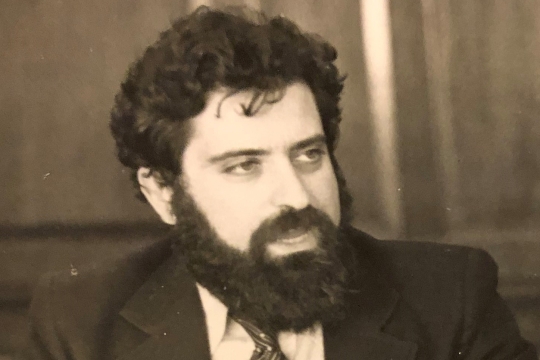
Rabbi Edythe Held Mencher formerly served as the URJ's caring community faculty member and is a licensed clinical social worker. She was interviewed by then Reform Judaism editor Aron Hirt-Manheimer and then managing editor Joy Weinberg.
How do we help a loved one who's engaging in destructive behavior and refusing assistance?
The painful truth is that we cannot always help another person-and if we expect to be able to change someone else in order for us to feel better, we may be setting ourselves up for double failure. What we can do is help ourselves by understanding our own feelings of powerlessness and getting the support we need to manage our emotional response. When we become less dependent upon another person's behavior in order to feel that "everything is okay," we will be calmer and better able to accept and empathize with that person, who may feel powerless to change.
It's also important to recognize that a person's refusal to accept "help" does not mean that they are refusing to "get better."
If a person refuses help, how can you say that they want to get better?
Other factors may be at work. Imagine, for example, a young child who has just fallen; terrified to look at his injury, he shouts that he does not need the doctor. Imagine a frail elderly woman who insists there's no need for a cane or walker, although she's repeatedly fallen. Imagine a man addicted to drugs who rejects medicine, therapy, and a rehab program because none of them helped in the past.
There are real fears behind these refusals of help. The child may fear that the doctor will inflict more pain than he's already enduring. The elderly woman may fear what is most unbearable for her-the loss of lifelong independence. The man suffering from addiction may feel that "nothing can help," his bluster and bravado all a cover-up for the fear that he-"a proven failure"-might fail at yet another intervention.
In fact, many of us, when presented with risks in life-taking a new job, ending close but unhealthy relationships-prefer the pain we know to the unknown suffering we imagine. Our Jewish tradition is rife with such stories. Consider the Israelites' initial response to God's having redeemed them from slavery in Egypt: they wanted to go back to Egypt, where at least they'd had food they enjoyed and knew what each day would bring, rather than have to depend upon God to provide manna while leading them toward an unknown land.
Also, current scientific research has shown that addictions produce biochemical pathways, making changing self-destructive habits extremely difficult physiologically as well as psychologically. Surely, if our habits were so easily changed through an act of will and an offer of help, each of us might rarely have to confess our sins on Yom Kippur, rather than struggling with the same weaknesses year after year.
Still, because change is difficult does not mean we should give up on ourselves or others. Our tradition teaches that change is possible. On the High Holy Days we're reminded how the Gates of Forgiveness remain forever open to those who truly wish to repent; and up until the last moment, God is eager to welcome us no matter how many times we've failed. In fact, we're told the world hangs in the balance: good and evil are represented as two sides of a balanced scale, and as little as a feather's worth of goodness can tip it toward redemption. This feather may not be the full achievement of change; rather, a small effort toward goodness may sustain the world.
We shouldn't expect success in changing the problematic behavior?
We may need to redefine what constitutes success. Rather than "solving the problem," success may mean moving a person from utter despair to a semblance of hope.
Keep in mind that altering the outcome behavior-what we tend to call "the problem"-is often doomed, unless a new way is found to alleviate the underlying pain. Self-destructive behaviors such as drug and alcohol abuse, self-inflicted violence, and risky thrill-seeking often serve as means of managing deeply troubling emotions, of temporarily diminishing or distracting the user from psychic pain, or at least giving the individual some "control" over the form in which that pain is experienced. Let's suppose, for example, a family member chances upon a young person who is cutting herself superficially with a razor in order to "manage" her pain. It's a terribly distressing sight, and the entire family wants this behavior to stop immediately. "Don't do that!" the family demands. "It's so upsetting. It's harmful. How could you do that to yourself?" A better approach would be to encourage the suffering young person to understand her feelings and, in the context of compassionate relationships, find other ways of managing them. So, the family might say to her, softly, "What are you feeling or thinking that is causing you to cut yourself? Let's find a way for you to get relief and help with these feelings and thoughts. We don't want you to suffer." In this way, too, the young person will experience those around her as caring about her pain and anxiety, not just about the pain and anxiety her behavior is inducing in them.
In my experience, the majority of troubled individuals really do wish to feel better and not be a source of disappointment and pain to their families. And I believe that most people can be helped in finding less harmful ways of coping with emotional pain.
What if you feel there's nothing more you can do? Is it morally acceptable to say, "You are fully responsible for your choices and their consequences. I've told you why your choices are wrong. I bear no further responsibility for what happens to you"?
According to Jewish teachings, we remain forever responsible for our loved ones. Simply stated, love includes sacrifice, putting aside our own needs temporarily in the service of another. It's important, however, to free ourselves from the notion that suffering and sacrifice are inherently good, necessary, and redemptive, when, in fact, they are unfortunate by-products of trying to provide appropriate care for our loved ones. All too often people veer toward extremes-either the "me first" paradigm or the model in Shel Silverstein's The Giving Tree in which, over the course of years of providing for a boy's needs, a tree is finally reduced to a stump. The ideal lies somewhere in between-to offer others care and compassion without neglecting ourselves.
How might we do that?
We might arrange for respite care and then treat ourselves to a replenishing vacation or at least some time out-perhaps an evening adult ed class or weekly Shabbat services. We might say to ourselves, "Right now I cannot think about my child/spouse/parent's problems." When we've found ways to let go even for a little while, we often feel less compelled to find sweeping solutions to extricate ourselves from extremely unpleasant predicaments.
What if we do decide we must break off the relationship?
Then I would suggest having an honest conversation with the loved one. You might begin: "I know you think it's your life and so the choices are all yours, but I care deeply about what happens to you because our lives are connected. I have told you why I think your choices are hurtful and damaging, and I hope you will be able to make different choices in the future. Right now, I need to pull back, because the way we are relating isn't helping either one of us. It is harmful for me to continue to (accept collect phone calls, pay your bills, enlist others in giving you yet another chance when you have trouble at work, with the law, etc.)."
In setting these new rules, it's important to acknowledge three things:
- We've reached our limit and are doing this to help ourselves. (We need to take responsibility for our choice if we hope loved ones will take responsibility for theirs.)
- I cannot help right now; this offers hope that the situation might change. Jewish tradition generally disapproves of a permanent severing of familial contact. Examples abound in the Torah of family members who separated for the apparent preservation of both individuals-Isaac and Ishmael, Jacob and Esau, Joseph and his brothers-but they have moments of reconciliation when they come together to bury their fathers.
- Someone else may be able to help; let me suggest alternative care.
If we feel guilty about the separation, how can we find peace within ourselves?
Guilt implies thinking we've done something wrong. It may be irrational-we may be expecting ourselves to be capable of things we're just not able to do. It may also be helpful-our conscience may be directing us to consider whether we are motivated by the right reasons and whether our actions have been sufficiently judicious and compassionate.
If we have decided that our actions are right "for now," we can seek the outside assistance of support groups, clergy, and mental health professionals. We also need to attend to the areas of our lives we can control, finding pleasure, hope, and caring wherever possible. This very struggle to find peace when our hearts are broken lies at the core of our tradition. We Jews strive to go on after heartbreak-to seek out goodness and hope, even after we have endured great pain.
Can one truly separate from a loved one emotionally?
It's been my experience as a psychotherapist and congregational rabbi that we can't truly sever our emotional connections to those we've loved, and it may not make sense to try to do so. In most cases, even a person who has caused us great pain has also made positive contributions to our lives; in attempting to cut all ties to this person, we risk forfeiting the good we've derived from our relationship and impoverishing ourselves in the process. This difficult work of finding some degree of separation while being able to retain inner connection is usually best accomplished with the guidance of a counselor.
Jewish tradition can also offer us some helpful models. Even when a person dies, we know the relationship remains within us eternally. So, just as each year we recite kaddish on the yartzheit (anniversary) of a person's death, we might use the birthday of a loved one from whom we are separated to think about and take some action on their behalf. We might send a card indicating that we're not ready for renewed regular contact, but offering our good wishes and hopes for a time when a relationship might be possible. We might donate to a cause (Alcoholics Anonymous, JACS, etc.) in the person's honor, or engage in related prayer and study.
Related Posts

